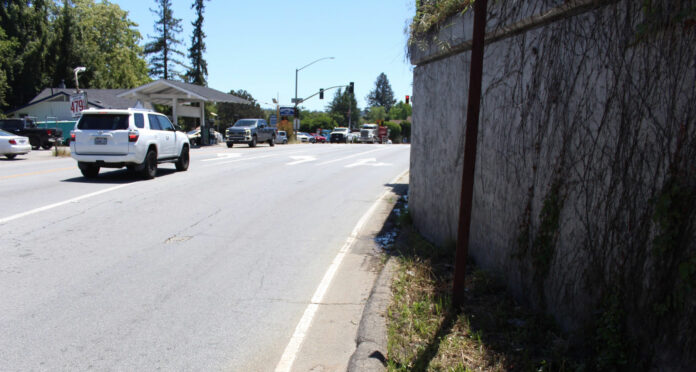
Every time Jeremy Paul Shreves rides the bus past the place where he accidentally killed pedestrian Josh Howard with his SUV in 2019, he says a prayer.
“‘I hope to dear God that his family is OK, and that my family will be OK,’” is the gist of it, the 52-year-old says, his voice drenched with torment.
But he’s never actually gotten out and paused at the section of Highway 9 directly north of the Felton and Graham Hill Road intersection characterized by minimal and deteriorating shoulders—until now.
“Yeah, that’s the first time that I’ve ever stopped and focused in on this spot,” he says, clearly uneasy, in an interview earlier this month. “It happened right there.”
He points toward a large retaining wall on the uphill side of the road where a broad-shouldered man would likely be over the white line at certain points.
This is where Kelley Howard and Dimitri Jaumoville’s lives changed forever, when Shreves struck and killed their 22-year-old son, as he walked home from a shift at Castelli’s Deli Café.
On June 5, 2020, Shreves pleaded no contest to felony reckless driving causing injury and was sentenced to 365 days in county jail and 36 months’ probation.
His probation was terminated and he was resentenced (he says he “pissed dirty” after smoking marijuana to avoid taking pain pills for a back injury) to two years in jail, in June 2021, with 264 days credited for time already served.
Howard and Jaumoville teamed up to sue Caltrans, claiming the State agency had avoided fixing a route they knew to be dangerous for years and should be held liable for their boy’s death.
In February a jury agreed, deciding on a $19.25 million verdict. They found Shreves was 51% to blame, and must pay $9,817,500, but felt Caltrans was only 2% less at-fault (49%) for the killing—meaning they now owe $9,432,500 in damages.
But Caltrans has asked for a new trial because they weren’t allowed to discuss Shreves’ methamphetamine use days prior (he was not found to be intoxicated at the time of the crash), claiming jurors acted in an illegal manner while deciding the case, and lamenting that they couldn’t point the finger at Howard for choosing to walk on the southbound side of the road.
Shreves says he isn’t sure whether he crossed the white line, or whether Howard stepped into the roadway. One thing he does know is he can’t get the incident out of his head.
“Every morning when I wake up, I have the thought in my mind—of the moment that it happened, and all the repercussions,” he says. “Then, before I go to bed, same thing. I have mild Asperger’s, so I cannot help but have these repetitive thoughts. And they hurt. I try to keep my chin up. You know, I’m a father myself.”
Shreves’ lawyer told him not to speak to the newspaper, but he’s frustrated at having been portrayed as a remorseless career criminal.
“I don’t want anybody to think that, like, I’m trying to lay the blame on anything else or anybody else,” he says. “My soul, my spirit, understands what happened. And I forgave myself a long time ago for that young person being in my way…but, the fact is, there’s only like a 15-inch strip (of shoulder on the southbound side), and nobody’s supposed to be there.”
The draft of a study created in partnership with Caltrans that recommends upgrading Highway 9, including the area where Howard was killed, was recently released for public comment.
Santa Cruz County Superior Court Judge Timothy Volkmann was set to consider whether the verdict against Caltrans should stick on May 26 at 8:30am in Department 5.
Caltrans declined to comment for this story.












